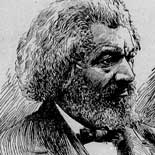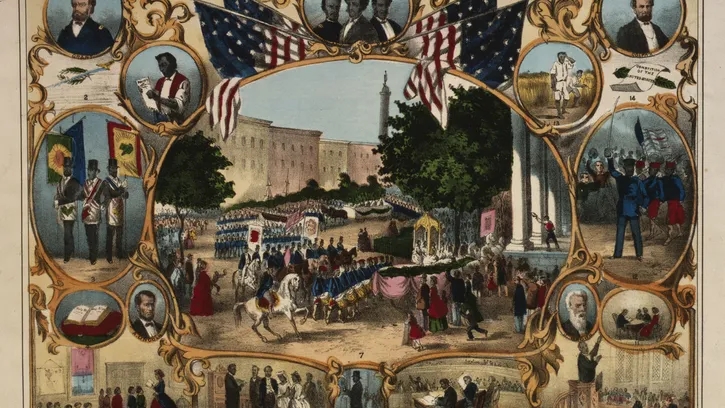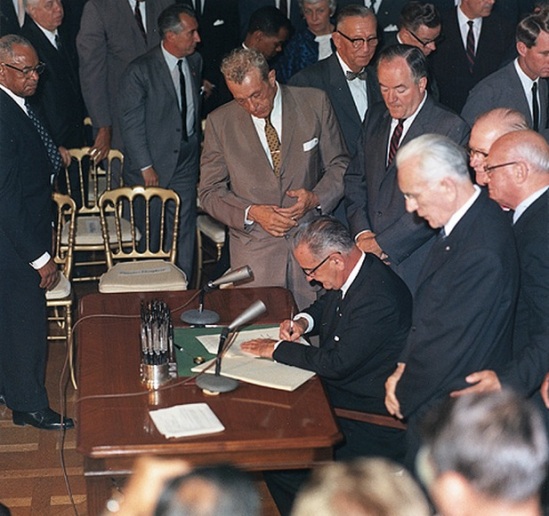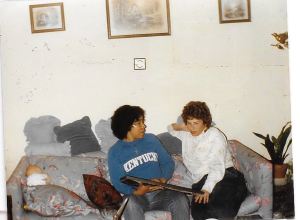
FREDERICK DOUGLASS
Reconstruction
THE ASSEMBLING of the Second Session of the Thirty-ninth Congress may very properly be made the occasion of a few earnest words on the already much-worn topic of reconstruction.
Seldom has any legislative body been the subject of a solicitude more intense, or of aspirations more sincere and ardent. There are the best of reasons for this profound interest. Questions of vast moment, left undecided by the last session of Congress, must be manfully grappled with by this. No political skirmishing will avail. The occasion demands statesmanship.
Whether the tremendous war so heroically fought and so victoriously ended shall pass into history a miserable failure, barren of permanent results,—a scandalous and shocking waste of blood and treasure,—a strife for empire, as Earl Russell characterized it, of no value to liberty or civilization,—an attempt to re-establish a Union by force, which must be the merest mockery of a Union,—an effort to bring under Federal authority States into which no loyal man from the North may safely enter, and to bring men into the national councils who deliberate with daggers and vote with revolvers, and who do not even conceal their deadly hate of the country that conquered them; or whether, on the other hand, we shall, as the rightful reward of victory over treason, have a solid nation, entirely delivered from all contradictions and social antagonisms, based upon loyalty, liberty, and equality, must be determined one way or the other by the present session of Congress. The last session really did nothing which can be considered final as to these questions. The Civil Rights Bill and the Freedmen’s Bureau Bill and the proposed constitutional amendments, with the amendment already adopted and recognized as the law of the land, do not reach the difficulty, and cannot, unless the whole structure of the government is changed from a government by States to something like a despotic central government, with power to control even the municipal regulations of States, and to make them conform to its own despotic will.
While there remains such an idea as the right of each State to control its own local affairs,—an idea, by the way, more deeply rooted in the minds of men of all sections of the country than perhaps any one other political idea,—no general assertion of human rights can be of any practical value. To change the character of the government at this point is neither possible nor desirable. All that is necessary to be is to make the government consistent with itself, and render the rights of the States compatible with the sacred rights of human nature.
The arm of the Federal government is long, but it is far too short to protect the rights of individuals in the interior of distant States. They must have the power to protect themselves, or they will go unprotected, spite of all the laws the Federal government can put upon the national statute-book.
Slavery, like all other great systems of wrong, founded in the depths of human selfishness, and existing for ages, has not neglected its own conservation. It has steadily exerted an influence, upon all around it favorable to its own continuance. And to-day it is so strong that it could exist, not only without law, but even against law. Custom, manners, morals, religion, are all on its side everywhere in the South; and when you add the ignorance and servility of the ex-slave to the intelligence and accustomed authority of the master, you have the conditions, not out of which slavery will again grow, but under which it is impossible for the Federal government to wholly destroy it, unless the Federal government be armed with despotic power, to blot out State authority, and to station a Federal officer at every cross-road.
This, of course, cannot be done, and ought not even if it could. The true way and the easiest way is to make our government entirely consistent with itself, and give to every loyal citizen the elective franchise,—a right and power which will be ever present, and will form a wall of fire for his protection.
One of the invaluable compensations of the late Rebellion is the highly instructive disclosure it made of the true source of danger to republican government. Whatever may be tolerated in monarchical and despotic governments, no republic is safe that tolerates a privileged class, or denies to any of its citizens equal rights and equal means to maintain them. What was theory before the war has been made fact by the war.
There is cause to be thankful even for rebellion. It is an impressive teacher, though a stern and terrible one. In both characters it has come to us, and it was perhaps needed in both. It is an instructor never a day before its time, for it comes only when all other means of progress and enlightenment have failed. Whether the oppressed and despairing bondman, no longer able to repress his deep yearnings for manhood, or the tyrant, in his pride and impatience, takes the initiative, and strikes the blow for a firmer hold and a longer lease of oppression, the result is the same,—society is instructed, or may be.
Such are the limitations of the common mind, and so thoroughly engrossing are the cares of common life, that only the few among men can discern through the glitter and dazzle of present prosperity the dark outlines of approaching disasters, even though they may have come up to our very gates, andare already within striking distance. The yawning seam and corroded bolt conceal their defects from the mariner until the storm calls all hands to the pumps. Prophets, indeed, were abundant before the war; but who cares for prophets while their predictions remain unfulfilled, and the calamities of which they tell are masked behind a blinding blaze of national prosperity?
It is asked, said Henry Clay, on a memorable occasion, Will slavery never come to an end? That question, said he, was asked fifty years ago, and it has been answered by fifty years of unprecedented prosperity. Spite of the eloquence of the earnest Abolitionists,—poured out against slavery during thirty years,—even they must confess, that, in all the probabilities of the case, that system of barbarism would have continued its horrors far beyond the limits of the nineteenth century but for the Rebellion, and perhaps only have disappeared at last in a fiery conflict, even more fierce and bloody than that which hasnow been suppressed.
It is no disparagement to truth, that it can only prevail where reason prevails. War begins where reason ends. The thing worse than rebellion is the thing that causes rebellion. What that thing is, we have been taught to our cost. It remains now to be seen whether we have the needed courage to have that cause entirely removed from the Republic. At any rate, to this grand work of national regeneration and entire purification Congress must now address itself, with full purpose that the work shall this time be thoroughly done. The deadly up as, root and branch, leaf and fibre, body and sap, must be utterly destroyed. The country is evidently not in a condition to listen patiently to pleas for postponement, however plausible, nor will it permit the responsibility to be shifted to other shoulders. Authority and power are here commensurate with the duty imposed. There are no cloud-flung shadows to obscure the way. Truth shines with brighter light and intenser heat at every moment, and a country torn and rent and bleeding implores relief from its distress and agony.
If time was at first needed, Congress has now had time. All the requisite materials from which to form an intelligent judgment are now before it. Whether its members look at the origin, the progress, the termination of the war, or at the mockery of a peace now existing, they will find only one unbroken chain of argument in favor of a radical policy of reconstruction. For the omissions of the last session, some excuses may be allowed.
A treacherous President stood in the way; and it can be easily seen how reluctant good men might be to admit an apostasy which involved so much of baseness and ingratitude. It was natural that they should seek to save him by bending to him even when he leaned to the side of error. But all is changed now. Congress knows now that it must go on without his aid, and even against his machinations. The advantage of the present session over the last is immense. Where that investigated, this has the facts.
Where that walked by faith, this may walk by sight. Where that halted, this must go forward, and where that failed, this must succeed, giving the country whole measures where that gave us half-measures, merely as a means of saving the elections in a few doubtful districts.
That Congress saw what was right, but distrusted the enlightenment of the loyal masses; but what was forborne in distrust of the people must now be done with a full knowledge that the people expect and require it. The members go to Washington fresh from the inspiring presence of the people. In every considerable public meeting, and in almost every conceivable way, whether at court-house, school-house, or cross-roads, indoors and out, the subject has been discussed, and the people have emphatically pronounced in favor of a radical policy. Listening to the doctrines of expediency and compromise with pity, impatience, and disgust, they have everywhere broken into demonstrations of the wildest enthusiasm when a brave word has been spoken in favor of equal rights and impartial suffrage. Radicalism, so far from being odious, is now the popular passport to power.
The men most bitterly charged with it go to Congress with the largest majorities, while the timid and doubtful are sent by lean majorities, or else left at home. The strange controversy between the President and Congress, at one time so threatening, is disposed of by the people. The high reconstructive powers which he so confidently, ostentatiously, and haughtily claimed, have been disallowed, denounced, and utterly repudiated; while those claimed by Congress have been confirmed.
Of the spirit and magnitude of the canvass nothing need be said. The appeal was to the people, and the verdict was worthy of the tribunal. Upon an occasion of his own selection, with the advice and approval of his astute Secretary, soon after the members of Congress had returned to their constituents, the President quitted the executive mansion, sandwiched himself between two recognized heroes,—men whom the whole country delighted to honor,—and, with all the advantage which such company could give him, stumped the country from the Atlantic to the Mississippi, advocating everywhere his policy as against that of Congress.
It was a strange sight, and perhaps the most disgraceful exhibition ever made by any President; but, as no evil is entirely unmixed, good has come of this, as from many others. Ambitious, unscrupulous, energetic, indefatigable, voluble, and plausible,—a political gladiator, ready for a “set-to” in any crowd,—he is beaten in his own chosen field, and stands to-day before the country as a convicted usurper, a political criminal, guilty of a bold and persistent attempt to possess himself of the legislative powers solemnly secured to Congress by the Constitution. No vindication could be more complete, no condemnation could be more absolute and humiliating. Unless reopened by the sword, as recklessly threatened in some circles, this question is now closed for all time.
Without attempting to settle here the metaphysical and somewhat theological question (about which so much has already been said and written), whether once in the Union means always in the Union,—agreeably to the formula, Once in grace always in grace,—it is obvious to common sense that the rebellious States stand to-day, in point of law, precisely where they stood when, exhausted, beaten, conquered, they fell powerless at the feet of Federal authority. Their State governments were overthrown, and the lives and property of the leaders of the Rebellion were forfeited. In reconstructing the institutions of theseshattered and overthrown States, Congress should begin with a clean slate, and make clean work of it. Let there be no hesitation. It would be a cowardly deference to a defeated and treacherous President, if any account were made of the illegitimate, one-sided, sham governments hurried into existence for a malign purpose in the absence of Congress. These pretended governments, which were never submitted to the people, and from participation in which four millions of the loyal people were excluded by Presidential order, should now be treated according to their true character, as shams and impositions, and supplanted by true and legitimate governments, in the formation of which loyal men, black and white, shall participate.
It is not, however, within the scope of this paper to point out the precise steps to be taken, and the means to be employed. The people are less concerned about these than the grand end to be attained. They demand such a reconstruction as shall put an end to the present anarchical state of things in the late rebellious States,—where frightful murders and wholesale massacres are perpetrated in the very presence of Federal soldiers.
This horrible business they require shall cease. They want a reconstruction such as will protect loyal men, black and white, in their persons and property; such a one as will cause Northern industry, Northern capital, and Northern civilization to flow into the South, and make a man from New England as much at home in Carolina as elsewhere in the Republic. No Chinese wall can now be tolerated. The South must be opened to the light of law and liberty, and this session of Congress is relied upon to accomplish this important work.
The plain, common-sense way of doing this work, as intimated at the beginning, is simply to establish in the South one law, one government, one administration of justice, one condition to the exercise of the elective franchise, for men of all races and colors alike. This great measure is sought as earnestly by loyal white men as by loyal blacks, and is needed alike by both. Let sound political prescience but take the place of an unreasoning prejudice, and this will be done.
Men denounce the negro for his prominence in this discussion; but it is no fault of his that in peace as in war, that in conquering Rebel armies as in reconstructing the rebellious States, the right of the negro is the true solution of our national troubles. The stern logic of events, which goes directly to the point, disdaining all concern for the color or features of men, has determined the interests of the country as identical with and inseparable from those of the negro.
The policy that emancipated and armed the Negro—now seen to have been wise and proper by the dullest—was not certainly more sternly demanded than is now the policy of enfranchisement. If with the negro was success in war, and without him failure, so in peace it will be found that the nation must fall or flourish with the negro.
Fortunately, the Constitution of the United States knows no distinction between citizens on account of color. Neither does it know any difference between a citizen of a State and a citizen of the United States. Citizenship evidently includes all the rights of citizens, whether State or national. If the Constitution knows none, it is clearly no part of the duty of a Republican Congress now to institute one. The mistake of the last session was the attempt to do this very thing, by a renunciation of its power to secure political rights to any class of citizens, with the obvious purpose to allow the rebellious States to disfranchise, if they should see fit, their colored citizens. This unfortunate blunder must now be retrieved, and the emasculated citizenship given to the negro supplanted by that contemplated in the Constitution of the United States, which declares that the citizens of each State shall enjoy all the rights and immunities of citizens of the several States,—so that a legal voter in any State shall be a legal voter in all the States.
Frederick Douglass Papers at the Library of Congress
December 1866



 THIS DAY IN HISTORY
THIS DAY IN HISTORY


